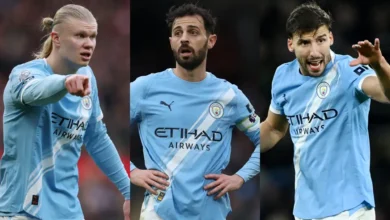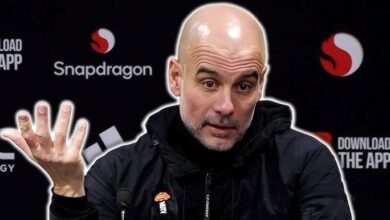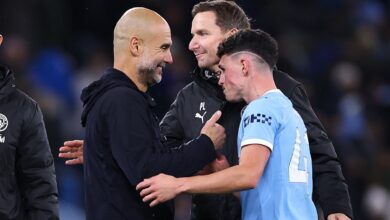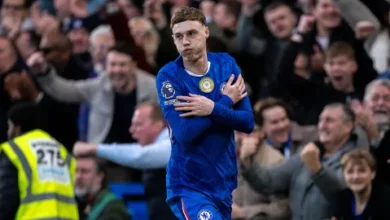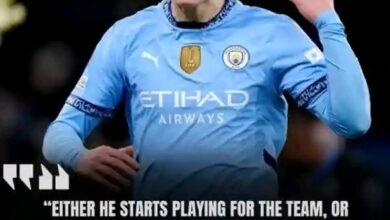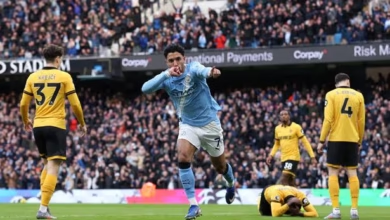Manchester City prioritize young English keeper over PSG star as Ederson replacement

Manchester City Football Club finds itself at a pivotal crossroads in their goalkeeping department as the summer transfer window intensifies. The Brazilian shot-stopper Ederson, who has been instrumental in the club’s unprecedented success over recent years, appears to be on the verge of a sensational departure to Turkish giants Galatasaray. This potential exodus has sparked a comprehensive reassessment of the club’s goalkeeping strategy, with significant implications for both the immediate future and long-term planning at the Etihad Stadium.
Ederson’s tenure at Manchester City has been nothing short of transformational. Since his arrival from Benfica in 2017, the Brazilian has redefined the role of a modern goalkeeper, combining exceptional shot-stopping abilities with unparalleled distribution skills that have become fundamental to Pep Guardiola’s tactical philosophy. His ability to initiate attacks from the back with precision long passes and his composure under pressure have made him one of the most valuable assets in world football. The prospect of losing such a pivotal figure represents one of the most significant challenges Manchester City has faced in recent years.
The interest from Galatasaray, while initially surprising given the Turkish club’s relatively modest stature compared to Manchester City, reflects the broader dynamics of modern football transfers. The Istanbul-based club’s ambitious pursuit of high-profile players, coupled with their ability to offer substantial financial packages and the appeal of being a guaranteed starter in European competition, makes them an attractive proposition for players seeking new challenges. For Ederson, who has won virtually everything possible with Manchester City, the opportunity to experience a different football culture while maintaining his status as a top-tier goalkeeper could prove irresistible.
The Strategic Shift Towards Youth and English Talent
In response to the looming departure of their Brazilian number one, Manchester City’s transfer strategy has taken a distinctly different direction from what many football observers might have expected. Rather than pursuing another established international star, the club appears to be prioritizing youth, potential, and crucially, English nationality. This strategic pivot represents a calculated response to both Financial Fair Play considerations and the Premier League’s homegrown player regulations.
James Trafford has emerged as the primary target to fill the considerable void that Ederson’s departure would leave. The young English goalkeeper, currently plying his trade at Burnley, represents everything Manchester City values in their modern recruitment philosophy. At just 25 years old, Trafford possesses the perfect combination of experience and potential that aligns with the club’s long-term vision. His English nationality also addresses the homegrown quota requirements that have become increasingly important in squad construction.
Trafford’s journey to becoming Manchester City’s top goalkeeper target is a testament to the club’s patient approach to player development. Having previously been part of the Manchester City academy system, he understands the club’s culture, expectations, and tactical demands. His subsequent progression through loans and permanent moves has provided him with the essential first-team experience that many young goalkeepers lack when transitioning to elite-level football.
The goalkeeper’s time at Burnley has been particularly instructive, offering him exposure to different tactical systems and the intense pressure of championship and Premier League football. This experience has undoubtedly contributed to his development as a well-rounded goalkeeper capable of adapting to various situations and pressure scenarios. His familiarity with English football’s unique demands, combined with his technical abilities, makes him an attractive proposition for Manchester City’s specific requirements.
The Donnarumma Dimension: Covering All Bases
While James Trafford appears to be Manchester City’s preferred option, the club’s interest in Paris Saint-Germain’s Gianluigi Donnarumma reveals the sophisticated nature of their transfer planning. The Italian international, despite being one of the world’s most accomplished goalkeepers, finds himself in an increasingly precarious position at PSG, with only one year remaining on his current contract.
Donnarumma’s situation at Paris Saint-Germain represents one of modern football’s more intriguing paradoxes. Despite being widely regarded as one of the finest goalkeepers of his generation, his future in the French capital remains uncertain. The combination of PSG’s complex squad dynamics, financial pressures, and the goalkeeper’s own ambitions has created a situation where a departure seems increasingly possible.
For Manchester City, Donnarumma would represent a ready-made replacement for Ederson, offering immediate quality and international experience. His penalty-saving prowess, shot-stopping ability, and experience in high-pressure situations would provide continuity in terms of performance levels. However, the financial implications of such a signing, including transfer fees, wages, and associated costs, must be weighed against the club’s broader strategic objectives.
The interest from multiple elite clubs, including Chelsea, Bayern Munich, and AC Milan, demonstrates Donnarumma’s market value and the competitive nature of modern goalkeeper transfers. This competition could potentially drive up costs and complicate negotiations, factors that Manchester City must carefully consider in their decision-making process.
Tactical Considerations and Guardiola’s Requirements
Pep Guardiola’s tactical system places unique demands on the goalkeeper position that extend far beyond traditional shot-stopping duties. The ideal Manchester City goalkeeper must possess exceptional distribution skills, comfort with the ball at their feet, and the ability to act as an additional outfield player when required. These specific requirements significantly influence the club’s recruitment strategy and help explain their preference for certain targets over others.
James Trafford’s technical profile suggests he could adapt well to Guardiola’s demanding system. His distribution skills, developed through exposure to modern coaching methods and tactical systems, align with Manchester City’s requirements. However, the transition from Burnley’s tactical approach to Manchester City’s intricate passing patterns and high-line defensive system would require significant adaptation and development.
The comparison with Donnarumma in this context is particularly interesting. While the Italian possesses superior experience and proven ability at the highest level, questions remain about his suitability for Guardiola’s specific tactical demands. His distribution, while competent, may not match the exceptional standards set by Ederson, potentially requiring tactical adjustments or intensive coaching to reach the required level.
Financial Strategy and Long-term Planning
Manchester City’s apparent preference for James Trafford over more established alternatives reflects broader financial and strategic considerations that extend beyond immediate performance requirements. The club’s approach to Financial Fair Play regulations, combined with their commitment to sustainable long-term success, influences every major transfer decision.
Trafford’s relatively modest transfer fee compared to alternatives like Donnarumma would allow Manchester City to allocate resources to other areas of squad improvement. This financial efficiency, combined with the potential for long-term appreciation in the player’s value, aligns with the club’s sophisticated approach to squad management and asset development.
The homegrown player considerations add another layer of strategic value to Trafford’s potential signing. With Premier League and UEFA regulations requiring specific quotas of homegrown players, Trafford’s English nationality provides additional squad flexibility and reduces pressure in other areas of recruitment.
The Competitive Landscape
The goalkeeper transfer market has become increasingly competitive, with elite clubs worldwide recognizing the position’s importance in modern football. Manchester City’s pursuit of their preferred targets takes place against this backdrop of intense competition and rising valuations.
Chelsea’s interest in Donnarumma, along with approaches from Bayern Munich and AC Milan, illustrates the global demand for elite goalkeeping talent. This competition could potentially work in Manchester City’s favor regarding their pursuit of James Trafford, as other clubs focus on more established alternatives.
The Turkish dimension, represented by Galatasaray’s interest in both Ederson and potentially other targets, adds another layer of complexity to the transfer equation. The financial resources available to Turkish clubs, combined with their ability to offer European competition and significant playing time, makes them formidable competitors in specific market segments.
Risk Assessment and Contingency Planning
Manchester City’s approach to the goalkeeper situation demonstrates sophisticated risk management and contingency planning. By maintaining interest in multiple targets while clearly prioritizing Trafford, the club ensures they have alternatives should their primary target become unavailable or negotiations stall.
The risk profile associated with different targets varies significantly. Trafford represents potential and familiarity but lacks proven experience at the highest level. Donnarumma offers immediate quality but comes with higher financial costs and potential adaptation challenges. This risk-reward calculation will ultimately determine the club’s final decision.
The timeline considerations add urgency to these decisions. With the transfer window progressing and pre-season preparations underway, Manchester City must balance thorough evaluation with the practical needs of squad preparation and integration.
Conclusion: A Defining Moment for Manchester City
The resolution of Manchester City’s goalkeeping situation will represent a defining moment in the club’s recent history. The decision between youth and experience, potential and proven quality, will have implications extending far beyond the immediate future.
James Trafford’s emergence as the preferred candidate reflects Manchester City’s confidence in their development systems and their commitment to strategic long-term planning. Should this pursuit prove successful, it would demonstrate the club’s ability to identify and develop talent while maintaining competitive standards.
The broader implications of this transfer strategy extend to Manchester City’s identity and approach to squad construction. The emphasis on English talent, youth development, and financial sustainability suggests a mature approach to football management that balances immediate competitive needs with long-term institutional success.
As the transfer window progresses and decisions crystallize, Manchester City’s handling of their goalkeeping succession will be closely scrutinized by football observers worldwide. The success or failure of their chosen approach will provide valuable insights into modern football’s complex dynamics and the evolving nature of elite club management.
The stakes could not be higher, with Manchester City’s continued dominance potentially dependent on making the right choice between competing philosophies and approaches. In this context, the club’s decision-making process represents more than simply replacing a goalkeeper; it embodies their vision for sustained success in an increasingly competitive football landscape.






